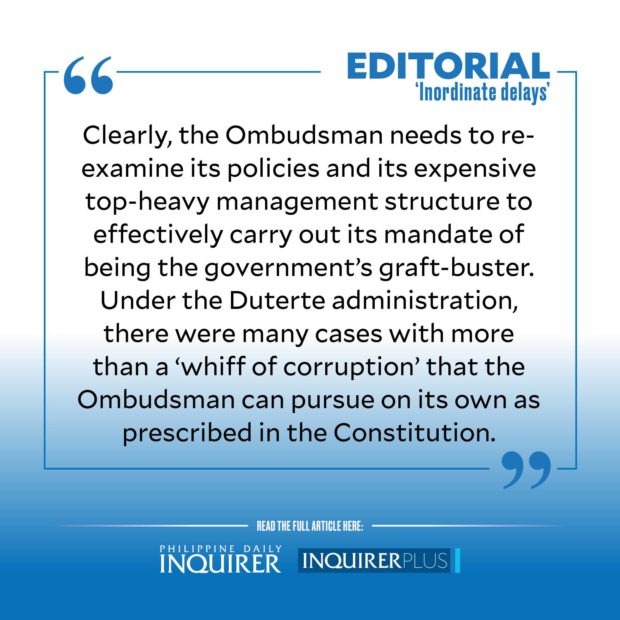‘Inordinate delays’
 The filing last week of graft charges by the Ombudsman against at least 43 immigration officers and personnel involved in the so-called “pastillas” bribery scam has brought a fitting closure to one of the biggest corruption cases under the outgoing Duterte administration.
The filing last week of graft charges by the Ombudsman against at least 43 immigration officers and personnel involved in the so-called “pastillas” bribery scam has brought a fitting closure to one of the biggest corruption cases under the outgoing Duterte administration.
The Ombudsman found “sufficient grounds” to file charges at the Sandiganbayan against the Bureau of Immigration (BI) personnel who, it said, were “probably guilty thereof and should be held for trial.” Among those charged were Marc Red Mariñas, the BI’s former deputy commissioner for ports operations, who had been tagged as the “ring leader” of the scheme in which illegal Chinese workers for the Philippine Offshore Gaming Operations (Pogo) were allowed to enter the country in exchange for P10,000 in bribe money, that was wrapped in white paper and rolled like the “pastillas” milk candy.
Credit for this positive development should go to Sen. Risa Hontiveros, chair of the Senate committee on women, who first exposed in February 2020 the alleged human trafficking and prostitution rings involving Pogos and corrupt immigration officers. As her committee conducted hearings that spanned two years, a whistleblower, immigration officer Allison “Alex” Chiong approached Hontiveros and spilled the beans on the bigger “pastillas” scam that was said to have involved nearly the entire bureau and amassed as much as P10 billion in bribes.
It was commendable that the Ombudsman, the main anticorruption arm of the government, acted swiftly on the findings and recommendations of Hontiveros’ committee, which the Senate adopted in February this year.
Despite this plus point, the Ombudsman needs to do a lot of catching up to fulfill its mandate of upholding public accountability by going after high-ranking officials and government employees involved in other cases of graft and corruption.
The Supreme Court recently took the Ombudsman to task for its “inordinate delay” in filing criminal charges against erring government officials.
In a Feb. 15 decision, the high court voided the filing of graft charges against Lilybeth Perez, an antifraud officer of the Bureau of Internal Revenue, as it took the Ombudsman 10 long years to indict her. Charges were filed against Perez in 2005 for failure to submit her statement of assets, liabilities and net worth (SALN) but her indictment only came in 2015.
“Such delay in completing the preliminary investigation is clearly unjustified,’’ said the high court resolution penned by Chief Justice Alexander Gesmundo. It was the latest in a number of rulings that absolved public officials facing graft charges due to the Ombudsman’s failure to promptly finish its preliminary investigation, according to a report in this paper.
Regrettably, the Ombudsman’s dismal performance comes in the wake of another negative report, this time from the Commission on Audit (COA), which found that the agency’s management team was top-heavy.
A 20-page Audit Observation Memorandum by a COA team led by Florence Villaluz and OIC supervising auditor Joey Bernardino last February found that the Ombudsman has an “inverted pyramid” management where top-level positions dominated its workforce.
The COA report found that high-level positions (those that paid P115,000 to P140,000 in monthly salaries) comprise 64 percent or 291 officers, while mid-level positions comprised 19 percent or 86 officers. Low-level positions accounted for only 17 percent or 80 employees.
The COA report said this was “far from the ideal workforce set up,” and that those in low-level and mid-level positions are “considered foot soldiers doing most of the legwork.”
“Gaps in structural design and imbalances among the Ombudsman’s workforce created mismatches of tasks that need to be done and the personnel that gets the job done, thereby resulting in lesser productivity,’’ the COA report said.
Whether or not this top-heavy structure caused the delays in resolving cases, the Ombudsman certainly must consider the COA report if it wants to solve its own inefficiency.
There’s no ignoring as well the much-criticized move of Ombudsman Samuel Martires to bar the release of the SALN of President Duterte and other high officials, seen by many as a setback in the fight against endemic government corruption. In September last year, Martires even urged the House to amend the law so that people making comments on the SALNs of public officials would be punished with five years in jail.
Clearly, the Ombudsman needs to re-examine its policies and its expensive top-heavy management structure to effectively carry out its mandate of being the government’s graft-buster. Under the Duterte administration, there were many cases with more than a “whiff of corruption” that the Ombudsman can pursue on its own as prescribed in the Constitution.
For one, there’s the allegedly anomalous P11-billion pandemic contracts awarded to the undercapitalized but well-connected Pharmally Pharmaceutical Corp. which the Senate had also uncovered, but which report was ultimately abandoned by some senators. Will the Ombudsman go after the Malacañang and budget officials linked to this suspicious deal to show that it means business?
MORE EDITORIALS
Children of struggle and freedom




















